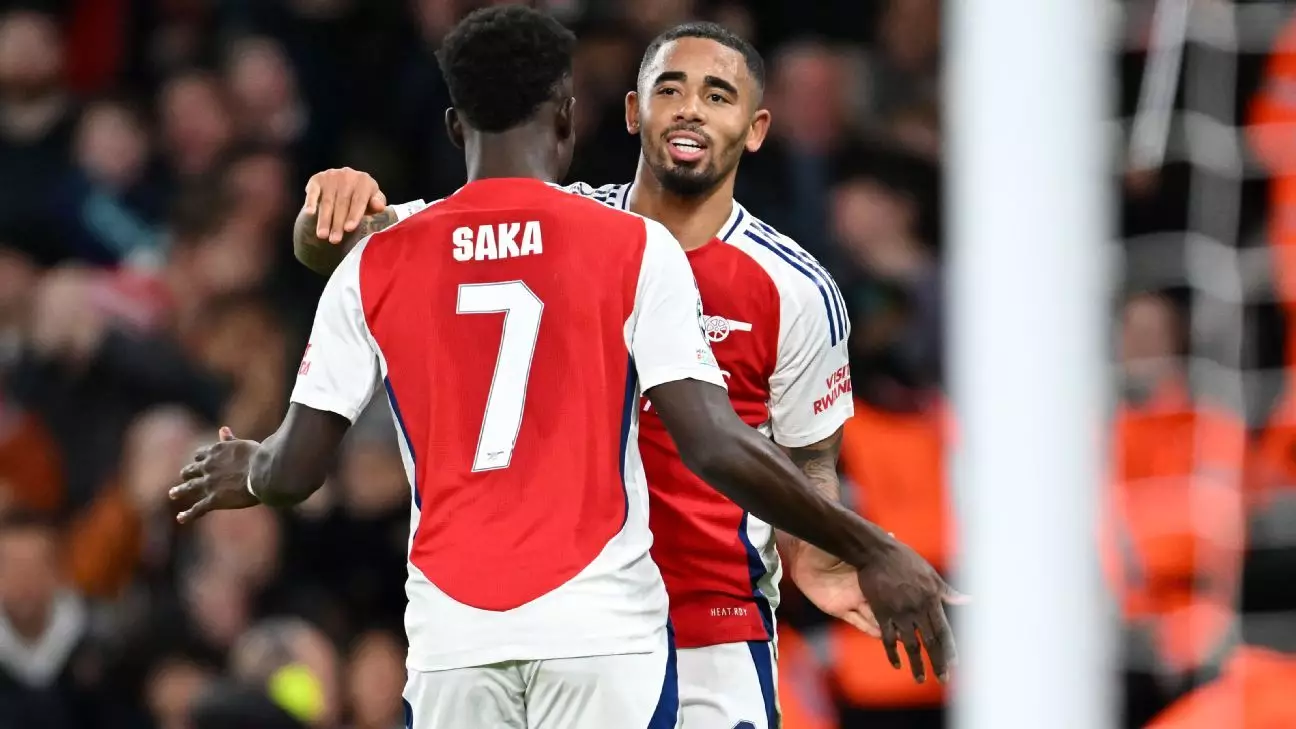Arsenal’s revitalization has been a narrative of evolution, particularly following the arrivals of Gabriel Jesus and Oleksandr Zinchenko from Manchester City in the summer of 2022. These two seasoned players were anticipated to provide not just skill, but also a winning mentality to an Arsenal side brimming with youthful exuberance. However, as the Gunners steamrolled AS Monaco with a commanding 3-0 victory at the Emirates Stadium, it became evident that this new era may be unfurling without their initial cornerstones. This article delves into how Arsenal’s victories are increasingly defined by emerging talents rather than established stars, hinting at shifts within the team’s dynamics and performance standards.
A significant factor in this transformation is the emergence of Bukayo Saka. His remarkable performance against Monaco, which included two well-deserved goals, highlights a shift in Arsenal’s focal point. Saka has not only adapted but thrived under the pressures of high-stakes competitions. Despite the presence of experienced talents like Jesus, who has faced a frustrating slump in form, it was Saka’s prowess that dictated the game. His ability to seize opportunities and convert them into goals dominated the match narrative, further embedding himself as a pivotal figure within this young squad.
After struggling to find the back of the net in his past 32 matches, Gabriel Jesus found himself in the spotlight for the wrong reasons during this encounter. While his assist for Saka’s first goal was notable, his repeated failures to convert key chances demonstrated a concerning regression. The departure of key players like Jesus from the limelight during critical matches underscores a transformation in roles within the squad. This opens up space for the younger generation to take center stage, prompting reflections on the long-term viability of relying exclusively on seasoned players for match-winning contributions.
Arteta’s Tactical Evolution
Mikel Arteta’s strategic choices have also significantly influenced Arsenal’s latest successes. His decision to field the talented Myles Lewis-Skelly – the youngest player to start in a Champions League game for Arsenal in over a decade – underscores the manager’s confidence in youth and reflects an evolving tactical philosophy. This bold move not only paid dividends but raised questions about squad depth and the future roles of experienced players like Kieran Tierney, who found himself on the bench.
Arteta’s task now extends beyond merely nurturing youth; it includes refining their decision-making skills under pressure. As he noted after the Monaco match, the failure to convert promising opportunities into goals could have proven costly and is an area earmarked for improvement. In emphasizing the necessity for players to autonomously assess scenarios on the pitch, Arteta is subtly shifting the responsibility of performance from management to the players themselves.
With experienced players, like Zinchenko sidelined due to injury, the Gunners’ defensive resilience has been called into question. Their reliance on lesser-known or less consistent players can lead to vulnerabilities. This necessitates not only an understanding of individual skill sets but a broader application of teamwork to ensure tactical integrity remains intact. While Zinchenko’s potential departure could complicate Arsenal’s plans, his absence exposes the need for a cohesive defensive solution.
Conversely, younger players like Saka and Lewis-Skelly are illustrating that they may be more than capable of propelling the team forward. Saka, in particular, is transforming from a promising talent into a consistent match-winner, recording impressive stats that rival some of the league’s elite. Such contributions indicate that Arsenal’s strategy may benefit from nurturing a blend of experience and young talent, rather than depending solely on aging players who have struggled to maintain form.
As Arsenal continues navigating what can only be described as a transitional phase, the path forward should involve a delicate balance between leveraging experience and promoting youth. While Jesus and Zinchenko were initially viewed as critical components of the team’s ambitions, the Gunners are now witnessing the rise of a crop of young stars willing to take the mantle. With Arteta at the helm, Arsenal’s future looks promising—an exhilarating mix of youthful exuberance and tactical innovation, reshaping their identity in the fiercely competitive landscape of European football. The club’s ability to embrace this evolution may well determine whether they remain a formidable force or simply a shadow of their aspirational past.

